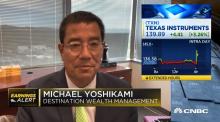How Can the Markets Rise When Things Look so Bad Right Now?
Here is this week’s audio link about the content’s of this week’s Common Sense.
https://www.dropbox.com/s/ghjgnz4kft3d8bk/7.22.20%20DWM%20Audio%20Update%20v3.wav?dl=0
The most common question I receive is a simple one: how can the equity markets rise if current conditions are so bad in the economy?
I was asked this question on CNBC this week as well and continue to find that this is the most perplexing question that people have regarding investment strategy.
I’ve answered this question in these communications, but I know it is still perplexing to many of you. I wanted to briefly outline a few of the factors that impact the market. Additionally, I will provide bullet points to keep in mind as you observe the economy and equity fluctuation.
Here’s the bottom line on the equity markets; they are forward-looking mechanisms and are currently looking past the pandemic crisis to when there will be a vaccine readily available. Though there will be economic damage for a significant period of time (including high unemployment), corporate earnings appear to be stabilizing and the expectation is earnings growth could resume next year. It’s possible that there will be a surprise on the upside next year as year-over-year comparisons will be dramatic given how bad things are now.
It’s important that you understand a simple fact about equity investments. Fluctuation can occur at any moment (sometimes for unknown or illogical reasons). It’s pretty much impossible to figure out fluctuations on the short-term. Someone asked me earlier this week if I thought the stock market will drop next week. My response? I have no idea.
It is possible that markets will drop, enter into a bear market, enter a correction, and behave in unexplainable ways. This is why it’s so critical to have a longer-term perspective to reduce the chance that short-term fluctuations will impact your long-term goals. Patience and an appropriate time horizon are great allies when investing.
Here are a few points to keep in mind the next time you’re puzzled on why the market behaves as it does:
- Equity markets are based on facts plus perception of what facts will look like in the future.
- Markets are not always logical.
- Medical conditions, including sickness and mortality, are awful realities. However, investors tend to look past these conditions towards future economic data. It’s all about the data.
- The expectation is the unemployment rates will fall significantly when the economy fully reopens. Markets don’t care much about today’s unemployment rate and are instead looking towards summer of next year.
- Equity markets are emotion and perception driven.
- Interest rates are low and expected to remain at historically low levels bolstering company earnings and consumer pocketbooks.
- The United States economy is considered one of the strongest in the world (despite understandable concerns about rising debt levels).
- As the global community panics, international investors tend to seek shelter in US assets.
- Many equity investments pay higher yields than similar bond investments driving investors to seek dividend-oriented equity assets.
- The United States maintains a strong technology sector which is helping drive innovation and create new jobs for the American economy.
- Equity markets are pricing for a reopening of the economy in the spring of 2021.
- Equity markets are pricing in successful vaccine development and deployment in the next nine months.
- Expectations are that current conditions are temporary and will mitigate as the pandemic subsides.
You may have a hard time agreeing with these perspectives, particularly if you look at economic data. But again, equity markets look past today and look towards the future.
On a related note, when Destination Wealth Management makes equity investments, we don’t look 12 months from now. We look three to five years from now as we determine cash flow expectations and share price appreciation potential. It is not uncommon for us to invest in an asset that we believe will struggle short-term but has a positive outlook in the long-term.
I suppose investing is a little bit like a knee injury for a basketball player. That usually takes about a year for recovery. For six months it’s hard and difficult and discouraging. But if one looks longer-term, the prognosis tends to be better. It doesn’t mean that there won’t be a lasting impact from the knee injury; there likely will be. But generally, 90% recovery is expected.
That’s pretty much how markets work. They are looking past current conditions no matter how illogical that might seem.
The opinions expressed herein are provided for informational purposes only and are not intended as investment advice. All investments involve risk, including loss of principal invested. Past performance does not guarantee future performance. Individual client accounts may vary. Although the information provided to you on this site is obtained or compiled from sources we believe to be reliable, Destination Wealth Management cannot and does not guarantee the accuracy, validity, timeliness or completeness of any information or data made available to you for any particular purpose. Any links to other websites are used at your own risk.





